03.04.2024.UNTOUCHABLES NEWS.BY Sivaji Team chennai 26.
- The Soft Power…
The Soft Power Of Buddhism Carries Enormous Political Influence
 Team StratNews
Team StratNews- April 2, 2024 - 7:05 pm
- 2 minutes read
The Buddha lived his years in India, he preached here and died here and there was a time when Buddhism had spread all over this country, as far as Afghanistan, to southeast Asia and beyond, says Rinpoche Jangchup Choeden, secretary-general of the International Buddhist Confederation in Delhi (IBC). He was speaking to Stratnews Global in the wake of the successful display of the relics of Buddha and his two disciples, in four cities in Thailand including Bangkok. Thousands turned out to see the relics. It was a reminder to the world that whatever claims China or other countries may make on Buddha and the faith that bears his name, the fact remains that his learning, life and times were in India. Choeden acknowledged that India invoking the soft power of Buddha and Buddhism is of recent origin, perhaps no more than a decade old. But it was necessary given that it helps India build on existing political relationships. For instance, the Cambodian authorities are keen on a display of the relics in their country. Laos could be another. Buddhism flourishes in other parts of Southeast Asia, also in South Korea, Taiwan and Japan, in Mongolia, and pockets of Russia. Buddhism is among the fastest growing faiths in China even though the ruling Communist Party is officially atheist. The IBC, for its part, is also working to enhance connectivity and exchanges with Buddhist scholars all over the world. This is important given that Buddhism does not have a common liturgy nor a supreme church unlike Christianity. Buddhists talk to each other in a bewildering variety of languages and written scripts. Technology is helping facilitate communication. The practice of Buddhism also varies, for instance the Hinayana and Mahayana strains of Buddhism are well known. Hinayana rejects idol worship and seeks individual salvation via consciousness and meditation. Mahayana believes that anybody can attain salvation.
MCM holds lecture on Buddhist Philosophy
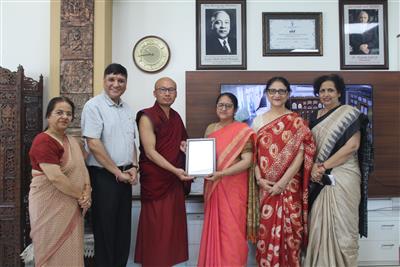
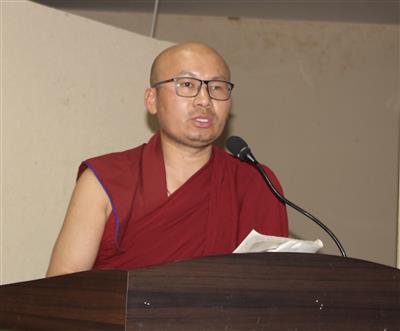
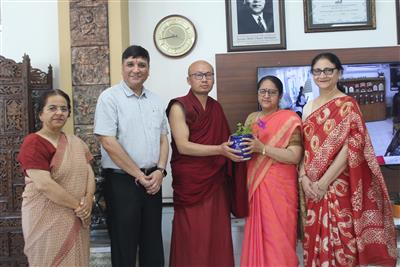
For further display of news in English with photographs in JPG file on "indianewscalling.com"
Express View on Alwar caste violence: What politics and policy forget
It shows the endemic nature of a problem that politics and policy need to do more to address

 Uttar Pradesh, Rajasthan and Bihar recorded the highest number of crimes against SCs.
Uttar Pradesh, Rajasthan and Bihar recorded the highest number of crimes against SCs.In the run-up to elections, as the prime minister speaks of the four castes that matter — the poor, women, youth and farmers — and the main Opposition party, Congress advocates for a nation-wide caste census, on Saturday, an eight-year-old Dalit boy got an early, unwarranted lesson in deeply ingrained inequality. On the premises of a government school in a village in Rajasthan’s Alwar, the Class IV student was assaulted for touching a bucket of water.
When confronted afterwards, the accused issued casteist slurs and a brazen declaration that he could not be brought to book for the incident. The impunity of the act points to a grim and sobering reality: That between the big ideas of social justice and big-ticket ameliorative schemes such as SHRESHTA (Scheme for Residential Education for Students in High Schools in Targeted Areas) and SHREYAS (Scholarships for Higher Education for Young Achievers Scheme), aimed to make classrooms more equal spaces, caste violence remains an everyday reality in the country.
The data released in December last year by the National Crime Records Bureau (NCRB) for the year 2022 underlines the increasing vulnerability of Dalits in India to caste-based violence. In 2022, a total of 57,582 cases were registered for crimes against Scheduled Castes (SCs), an increase of 13.1 per cent over the previous year. Crimes against Scheduled Tribes (STs) saw an increase of 14.3 per cent over those registered in 2021.
Uttar Pradesh, Rajasthan and Bihar recorded the highest number of crimes against SCs. Behind the cold, hard numbers, some of the human faces of this discrimination included a 15-year-old SC boy in UP’s Auraiya who died after being beaten by an upper-caste teacher for an alleged spelling mistake in September 2022, a nine-year-old in Rajasthan’s Jalore who succumbed to injuries inflicted by an upper-class teacher for drinking water from a pot meant for upper-caste teachers.
Even taking into account the fact that there is now an increase in the number of complaints being registered, this points to a glaring dissonance between the vision of a viksit and atmanirbhar Bharat and the ground reality. While both the Centre and the Opposition speak of justice and empowerment, a lot more needs to be done, in terms of institutionalising and increasing sensitisation and safeguards, to address this entrenched injustice.

Tamil Nadu: Melpathi’s Dalit residents demand separate booth for LS polls
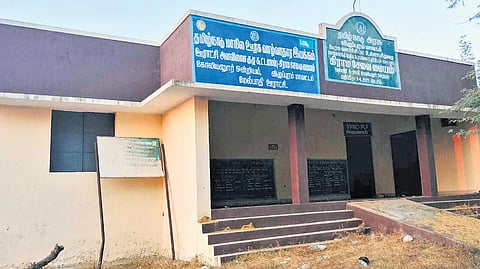
VILLUPURAM: More than 450 voters living in the Dalit residential area of Melpathi village have demanded a separate polling booth for fear of entering the caste Hindu locality to reach the existing booth. In April 2023, a number Dalit residents were physically assaulted and verbally abused for entering the village’s Draupadi Amman Temple.
In a petition to the collector on Friday, the Dalits said, “We fear the caste Hindus and their tactics of pulling us into conflict at every chance they get. The polling booth for Melpathi is located in the caste Hindu area and we do not feel safe going there on the polling day. Hence, we demand a separate booth for us to vote.”
Speaking to TNIE, 34-year-old Karthik (name changed), a Dalit resident, said, “It is not out of fear that we seek a separate booth, but for safeguarding our self-respect and dignity. A year ago, our relatives were chased and attacked by caste Hindus for entering the temple, after which we had to cut ties with them.
They also have stopped employing us as agricultural workers. None of them have been arrested for their violence and blatant caste discrimination to this day.” He further added that the government’s inaction and police apathy in handling the incident have led the Dalits of Melpathi to distrust the security provided by the governing bodies on polling day. “Elections cannot become one more reason for us to go through the same pain again,” he asserted.
One of the petitioners, a 60-year-old Dalit resident, told TNIE, “If setting up a whole new booth is not possible, at least let us cast our votes at the collectorate. We all will spend our own money to travel there on polling day. There is no way we will go into the oor (caste Hindu area) where we have been utterly humiliated for merely entering a temple.” He added that their proposal has also been conveyed to the DRO who met them on Friday.
Melpathi Dalits have proposed for a separate booth at the empty village service centre building located in their side of Melpathi. However, official sources stated that a booth can be allocated only if the voter count is above 1,500.
In response to the issue, Collector Palani told TNIE, “We have marked the Melpathi booth as a critical/vulnerable booth. There will be special protection by CRPF personnel, live webcam casting, state police force and micro observers will be deployed to ensure the Dalits can cast their votes in peace and no mishap occurs. Moreover, we have also warned the caste Hindu residents of severe police action if they pick a quarrel with the Dalits on election day.
Dalit History Month Special: Dr. Ambedkar's Democratic Vision- How Did He Shape India's Democracy?

Lucknow: Democracy is a form of government in which power is vested in the hands of the people, either directly or through elected representatives. It is characterized by principles such as political equality, freedom of expression, regular, free, and fair elections.
Democracy in India has proved to be an enabler of the upward mobility of Dalits. If the constitution bestowed the Dalits of the country with some rights like reservation in jobs and education, the right to vote, etc., democracy, with its reins in the hands of people, ensures that there remains an accountability, and each vote counts, irrespective of caste, stature, etc.
Today, as part of Dalit History Month in the run-up to Ambedkar Jayanti, we delve into Ambedkar’s perspective on Democracy as he presented his opinion on the subject through his writings between 1917 and 1956 i.e. till his death.
Dr Ambedkar’s espousal of the democratic system can be traced back to 1917. While presenting his evidence before the Southborough committee, or the Franchise Committee, which was collecting evidence on the quantum and qualifications to be fixed for the Indian voters.
ADVERTISEMENT
Ambedkar set forth his idea of democracy by supporting three essential pillars- Democratic form of governance, the right to vote for all, adequate (if not proportional) representation for all sections of society.
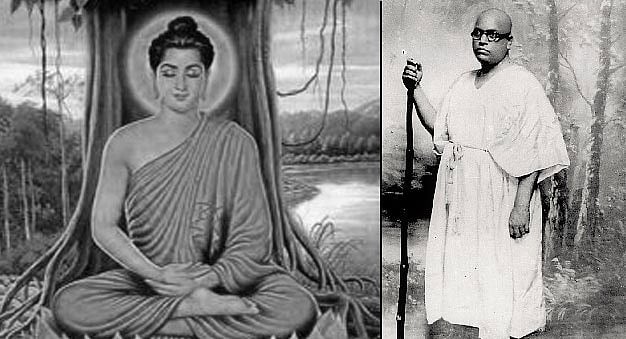
In 1935, he described democracy as a mode of associated living in his bestselling book “The Annihilation of Caste.”
"(In an ideal society) there should be varied and free points of contact with other modes of association. In other words, there should be social endosmosis. This is fraternity, which is only another name for democracy. Democracy is not merely a form of Government. It is primarily a mode of associated living, of conjoint communicated experience. It is essentially an attitude of respect and reverence towards fellowmen."
Dr. Babasaheb Ambedkar was grounded in the notion of Indian first and an Indian last but he considered nationalist sentiments because they helped move the "Wheels of the Democracy" - for him, the notion of Democracy was superior to Indianization or nationalization.
Ambedkar believed that Buddhism is more compatible with democracy.
"Religion has been a source of morality or ethics for the majority of people. He propounded that no new prophet will emerge and therefore we must look into existing religions to find ethics that accord with democracy. While undertaking a comparative study of religions, Dr. Babasaheb Ambedkar came to the conclusion that Hinduism, by its very nature and essence, is not democratic. In a short survey of religions in the Buddha and the Future of His Religions, Dr. Babasaheb Ambedkar made this point. While it might be possible to create secular ethics (and we do not know how), the reconstruction in religions if they are open to examination might be one important way."
In Buddhism, Dr. Babasaheb Ambedkar found that the Dhamma is ethics and Ethics is Dhamma. Thus enabling ethical rule in a country.
He provided a cultural shape to Buddhism by embracing the Buddha's Dhamma on 14th October 1956 as he believed that it was fundamentally and essentially democratic.
Political Democracy and Social democracy
Ambedkar’s quest for Democracy which began in 1917 took a political shape with India becoming a Republic in 1950 and its electoral testing in 1952.
However, he had his share of skepticism with democracy as he writes:
"Democracy in India is only a top dressing of the Indian soil which is essentially undemocratic."
Ambedkar was fully aware of the gross contradiction between constitutional equality and the social equality prevailing in the country.
Dr Ambedkar firmly believed that social democracy was the base of political democracy. In a social democracy, he believed that social democracy is when the society practices liberty, equality, and fraternity.
In his speech in Constituent Assembly on 25th November 1949, he said:
“The third thing we must do is not to be content with mere political democracy. We must make our political democracy a social democracy as well. Political democracy cannot last unless there lies at the base of it social democracy. What does social democracy mean? It means a way of life that recognizes liberty, equality, and fraternity as the principles of life. These principles of liberty, equality, and fraternity are not to be treated as separate items in a trinity. They form a union of trinity in the sense that to divorce one from the other is to defeat the very purpose of democracy. Liberty cannot be divorced from equality; equality cannot be divorced from liberty. Nor can liberty and equality be divorced from fraternity. Without equality, liberty would produce the supremacy of the few over the many. Equality without liberty would kill individual initiative. Without fraternity, liberty equality could not become a natural course of things. It would require a constable to enforce them… For fraternity can be a fact only when there is a nation. Without fraternity equality and liberty will be no deeper than coats of paint.”
He added that without social democracy, those who suffer from inequality will blow up the structure of political democracy which this Assembly has to laboriously built up”.
The State of Democracy today through Ambedkarite lens
Speaking to The Mooknayak, Mangesh Dahiwale, an Ambedkarite intellectual, says, “Dr Ambedkar spoke about various types of democracies in India - Political democracy,
Social Democracy,
Intellectual Democracy,
Economic Democracy,
etc., and he believed that the absence of democracy in these aspects threatened Parliamentary democracy, and he cited the case of Germany and Italy under Hitler and Mussolini, respectively.
Given the state in India, where the opposition leaders are being intimidated through misuse of government institutions, Ambedkar would have definitely felt disappointed by the manipulation of democracy."
Magistrate booked for asking Dalit gang rape survivor to strip
https://timesofindia.indiatimes.com/city/jaipur/magistrate-booked-for-asking-dalit-gang-rape-survivor-to-strip/articleshow/108987170.cms
Download the TOI app now:
https://timesofindia.onelink.me/mjFd/toisupershare
Dalit leader Srinivasa’s key, close aides join Congress.
https://timesofindia.indiatimes.com/city/mysuru/dalit-leader-srinivasas-key-close-aides-join-congress/articleshow/108987035.cms
Download the TOI app now:
https://timesofindia.onelink.me/mjFd/toisupershare

Recent surge in anti-Dalit violence: Three attacks, two against minors, one against elderly womanThree concerning incidents of violence against Dalits have been reported in the past few days from the state of Uttar Pradesh
03, Apr 2024 | CJP Team
Three concerning incidents of violence against Dalits have been reported in the past few days from the state of Uttar Pradesh, a state with a poor record of containing crimes against the marginalised.
In two of these incidents, Dalit students were the victims while in the third incident, an elderly Dalit woman had to suffer brutal physical abuse after her goats strayed into the field of another. These incidents of violence have sparked an uproar amongst people.
CJP is dedicated to finding and bringing to light instances of Hate Speech, so that the bigots propagating these venomous ideas can be unmasked and brought to justice. To learn more about our campaign against hate speech, please become a member. To support our initiatives, please donate now!
These caste-based incidents of violence underscore the persistent discrimination and violence faced by Dalits in the state of Uttar Pradesh, currently being ruled by the Bharatiya Janata Party government. One should also note that the state of Uttar Pradesh has continuously topped the NCRB list of states where anti-Dalit instances are prevalent. After these three incidents, we have also provided an overview of the anti-Dalit incidents that have emerged in the state since the beginning of the current year.
Anti-Dalit Crimes (March 26-April 3, 2024)
Assault of minor Dalit student:
On April 2, reports of a minor Dalit student being beaten up for not touching the feet of the teacher emerged. As per a report of The Mooknayak, in Gorakhpur district of Uttar Pradesh, a Class VI Dalit student was beaten up by the teacher at a government primary school, namely Murarpur Primary School, for not touching his feet. It had been alleged that the teacher also used caste-related slurs while physically abusing the minor child. Notably, the teacher, Ravi Shankar Pandey, beat the student for not touching his feet as a mark of respect.
The report states that a case has been filed against the accused teacher in the Uruva police station of Gorakhpur district under the Scheduled Caste-Tribe Prevention of Atrocities Act and other related sections in the assault case. The complaint in the present matter had been made by the family members of the minor victim.
Additional Superintendent of Police (ASP) Jitendra Kumar stated to The Mooknayak that a case has been registered based on the complaint and the police is investigating. Action will be taken on the basis of investigation and evidence. It is essential to note that the accused teacher has reportedly been absconding since the incident.
Assault of Dalit elderly woman:
On March 31, a video showing a man beating up a woman with a stick started doing rounds on social media. The abuser can be seen brutally thrashing and slapping the woman. It is also essential to highlight here that the abuser can be heard hurling casteist slurs at her. The video had been uploaded on the ‘X’ profile of The Dalit Voice and can be accessed below.
As per a report in the Siasat, the woman in the video is a Dalit woman of 60. As provided in the report, she was subjected to brutality when her goat accidentally strayed into the latter’s fields. The incident occurred in Uttar Pradesh’s Bulandshahar region.
As per the media report, the state police have registered a case into the incident under the SC/ST Act and has assured of strict action against the abuser.
Bullet injuries to minor Dalit student:
On March 26, a clash was reported to have taken place between two groups in Silai Baragaon village in Milak area over the installation of a hoarding with a picture of Babasaheb Bhimrao Ambedkar. As per a report in the Siasat, during the said conflict, a 17-year-old Dalit boy named Sumesh Kumar received bullet injuries. These injuries ultimately led to his death. It is essential to note that the minor deceased child was returning home after writing his Class 10 examination.
Uttar Pradesh and increasing caste-based violence:
As per the ‘Crime in India, 2022’ report published by the National Crime Records Bureau, Union Ministry of Home Affairs, atrocities against Dalits increased manifold in 2022 from the previous years. The report, which also provides the state-wise data of Dalit atrocities, also depicted that the state of Uttar Pradesh recorded the highest number of atrocities. As per the report, a total of 15,368 cases of crimes against Dalits were reported in 2022. It is essential to note that the figures of Uttar Pradesh accounts for roughly 28% of the crimes committed against Dalit from all over the country as a total 57,428 crimes were reported to have been committed against Dalits in 2022.
It is essential to highlight here that with 15,368 total cases having been registered in the state, bringing the daily tally of atrocity cases to 40.
Anti-Dalit atrocities reported from Uttar Pradesh since 2024:
In the beginning of January, a 25-year-old Dalit woman found raped and strangled allegedly at the hands of a 27-year-old police constable, who is now identified as Raghvendra Singh, in Agra. The victim’s dead body was recovered from the room the constable had rented, hanging from the ceiling of Singh’s room.
A separate incident was reported after the Republic Day function at Sardar Singh Inter College in Narauli town, two students reportedly assaulted and beat up a Dalit student who had finished his speech on Dr BR Ambedkar with the chant ‘Jai Bhim-Jai Bharat’. The said incident was reported from Narauli area of UP.
Another horrifying incident of violence against woman was also reported from UP’s Baghpat area in the same month with an 18-year-old Dalit woman being pushed into a cauldron of scalding hot oil. It is essential to note that she was protesting sexual harassment that she had faced when the owner of the oil mill she was working work at pushed her into the cauldron with the help of two other people.
In March, a brutal incident of Dalit atrocity was reported from Muzaffarnagar district in western Uttar Pradesh. As per the report of The Mooknayak, a 21-year-old Dalit man was allegedly beaten to death after being held hostage over a “love affair” in the Khatauli block of. The police had identified the victim as Ankit. Ankit was allegedly having an affair with a 30-year-old married woman belonging to the same village but of a different caste. The deceased was beaten to death after being held hostage.
Congress slams UP government, calls the state an “anti-Dalit haven”:
In December 2023, Congress chief Mallikarjun Kharge had termed the NCRB report to be BJP’s “black letter”, depicting the unsafety that surrounds the marginalised community of. Kharge also added that injustice, atrocities, and repression are part of the BJP’s decade-long agenda of dividing society.
After the aforementioned three cases of caste-based atrocities came to light, Congress national general secretary Jairam Ramesh said that Uttar Pradesh had become a “haven for lawlessness and anti-Dalit hate crime.” Attacking the Yogi Adityanath BJP-state government, Ramesh coined the ruling government to be a ‘double anyay’ sarkar. As per a report of Siasat, Ramesh said “In this Anyay-kaal, the only real slogan that the BJP adheres to is Sabka soshan, Sabka utpeedan (everyone’s exploitation, atrocities on everyone)”.








Comments
Post a Comment